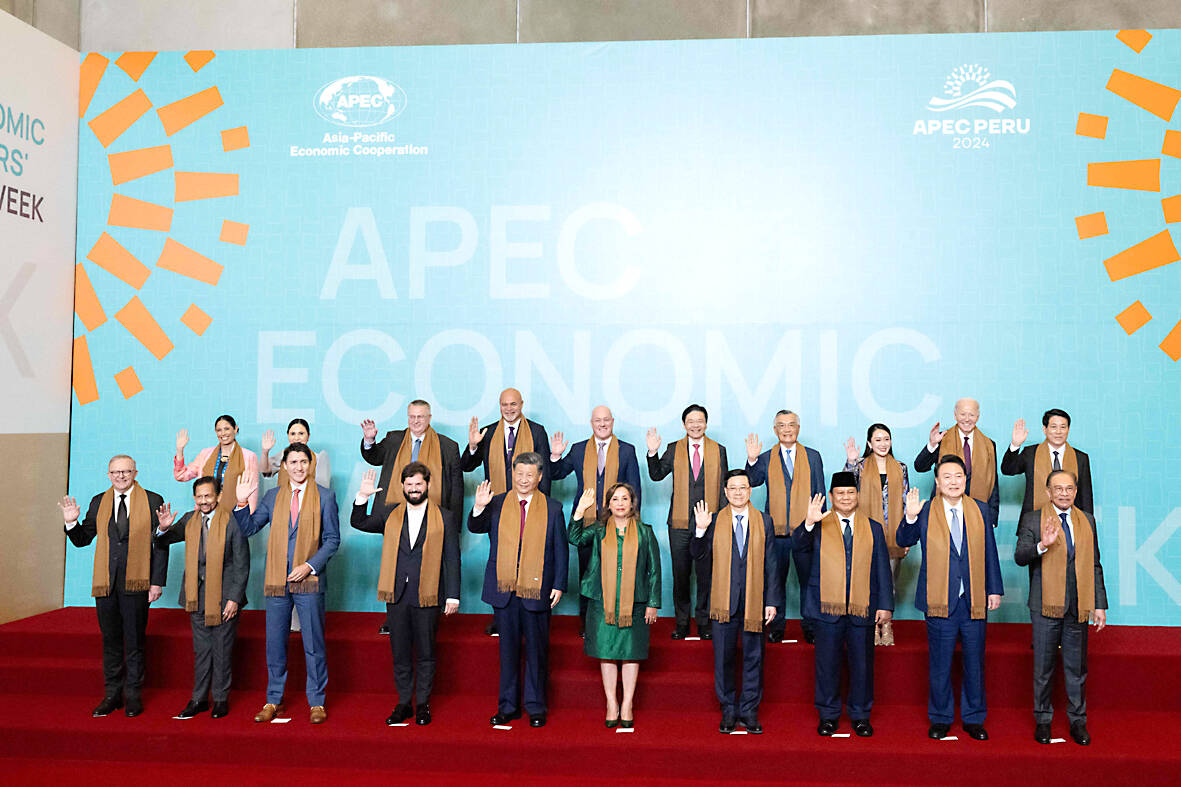Taiwan would participate in the 2026 APEC summit to be hosted by China after Beijing promised it would ensure the personal safety of attendees, Taiwanese national security sources said yesterday.
The APEC Leaders’ Machu Picchu Declaration announced yesterday said that China would host the APEC summit in 2026.
Beijing proposed hosting the summit shortly before this year’s gathering began on Friday, a national security official said, speaking on condition of anonymity.

Photo: AFP
Many APEC members expressed concerns about China hosting the event and said that prior communication over the decision was insufficient, the official said.
Taiwan brought up concerns about legal “guidelines” China announced in June that impose the death penalty on “die-hard” Taiwanese independence advocates, they said.
While Chinese courts have no jurisdiction over Taiwan, Taipei had expressed worries the guidelines would be used against not only Taiwanese officials in China, but also those from other APEC members as well, they said.
As APEC decisions are made based on consensus, the announcement in the leaders’ declaration that China was hosting the 2026 summit means that members had reached a consensus on the issue, the official said.
That would require that Beijing properly respond to the concerns raised by each member and fulfill its promises to them, including equal treatment of member nations, conformity to APEC rules and protection of personal security, they said.
“Other APEC members have similar concerns, so the fact that a consensus was reached [on China hosting the forum] means Beijing has made promises in response to all members’ relevant concerns,” National Security Council Deputy Secretary-General Hsu Szu-Chien (徐斯儉) told a news conference on Saturday.
Meanwhile, Taiwan’s APEC envoy, Lin Hsin-i (林信義), on Saturday said that he greeted Chinese President Xi Jinping (習近平) with a wave at the summit, but there was no handshake or conversation, a sign of the tensions between Taipei and Beijing.
Taiwan does not send its president to summits due to China’s objections. The forum is one of the few international meetings that both Taiwan and China take part in, and where officials from the two sides can interact, even if just to exchange pleasantries.
Lin said that while Taiwan held bilateral talks with many APEC members, with the Chinese president, there was just a greeting gesture across the room where leaders were gathered.
“The motion of a greeting has no details,” he said, adding that they did not shake hands.
The lack of interaction with Xi contrasts with Lin’s meeting with US President Joe Biden the previous day, which the Taiwanese delegation described as a “lively” exchange of views.
Last year, Taiwan representative Morris Chang (張忠謀), founder of Taiwan Semiconductor Manufacturing Co (台積電), also spoke with Biden, but not Xi.
In 2022, then 91-year-old Chang had a “very pleasant” and “polite” interaction with Xi at an APEC forum in Bangkok, where Xi asked about Chang’s health and Chang congratulated Xi on the success of the Chinese Communist Party’s 20th National Congress.

AIR SUPPORT: The Ministry of National Defense thanked the US for the delivery, adding that it was an indicator of the White House’s commitment to the Taiwan Relations Act Deputy Minister of National Defense Po Horng-huei (柏鴻輝) and Representative to the US Alexander Yui on Friday attended a delivery ceremony for the first of Taiwan’s long-awaited 66 F-16C/D Block 70 jets at a Lockheed Martin Corp factory in Greenville, South Carolina. “We are so proud to be the global home of the F-16 and to support Taiwan’s air defense capabilities,” US Representative William Timmons wrote on X, alongside a photograph of Taiwanese and US officials at the event. The F-16C/D Block 70 jets Taiwan ordered have the same capabilities as aircraft that had been upgraded to F-16Vs. The batch of Lockheed Martin

US President Donald Trump yesterday announced sweeping "reciprocal tariffs" on US trading partners, including a 32 percent tax on goods from Taiwan that is set to take effect on Wednesday. At a Rose Garden event, Trump declared a 10 percent baseline tax on imports from all countries, with the White House saying it would take effect on Saturday. Countries with larger trade surpluses with the US would face higher duties beginning on Wednesday, including Taiwan (32 percent), China (34 percent), Japan (24 percent), South Korea (25 percent), Vietnam (46 percent) and Thailand (36 percent). Canada and Mexico, the two largest US trading

GRIDLOCK: The National Fire Agency’s Special Search and Rescue team is on standby to travel to the countries to help out with the rescue effort A powerful earthquake rocked Myanmar and neighboring Thailand yesterday, killing at least three people in Bangkok and burying dozens when a high-rise building under construction collapsed. Footage shared on social media from Myanmar’s second-largest city showed widespread destruction, raising fears that many were trapped under the rubble or killed. The magnitude 7.7 earthquake, with an epicenter near Mandalay in Myanmar, struck at midday and was followed by a strong magnitude 6.4 aftershock. The extent of death, injury and destruction — especially in Myanmar, which is embroiled in a civil war and where information is tightly controlled at the best of times —

China's military today said it began joint army, navy and rocket force exercises around Taiwan to "serve as a stern warning and powerful deterrent against Taiwanese independence," calling President William Lai (賴清德) a "parasite." The exercises come after Lai called Beijing a "foreign hostile force" last month. More than 10 Chinese military ships approached close to Taiwan's 24 nautical mile (44.4km) contiguous zone this morning and Taiwan sent its own warships to respond, two senior Taiwanese officials said. Taiwan has not yet detected any live fire by the Chinese military so far, one of the officials said. The drills took place after US Secretary